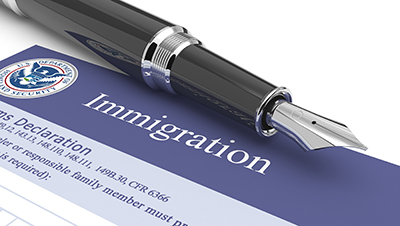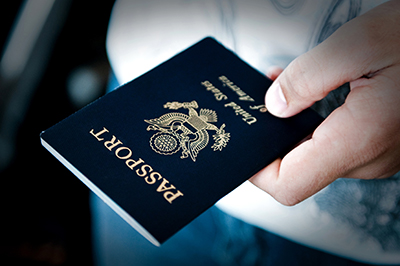What is an Immigration Medical Exam?

Immigration can be complex and time-consuming, though understanding the process makes it much less imposing. There are multiple types of entry classifications, each with different rules–but perhaps the most common requirement is a medical examination.
In this article, we’ll explain the exam process, including what to expect and how to prepare.
Medical Examination Definition for Immigration
The exam used for immigration purposes is not the same as a regular health exam.

The immigration medical examination definition actually means a screening rather than a typical trip to a doctor. This exam is meant to keep the existing population safe from communicable diseases and other health risks.
In this exam, you will only be tested for conditions specified by immigration rules: the doctor will not appraise your general health or make health-related recommendations. Although you don’t need to be completely healthy to pass this exam, you cannot suffer from communicable diseases, drug addictions, or mental disorders.
Who performs the exam?
You can’t just go to any doctor for this medical examination.

If it is conducted within the US, the exam must be performed by a specially-designated immigration doctor called a civil surgeon, who has been approved by U.S. Citizenship and Immigration Services (USCIS).
Medical examinations for US immigration conducted outside of the country are performed by a panel physician designated by the Department of State. For example, Canadian immigration exams are handled by CIC panel physicians instead of civil surgeons.
The Immigration Process
Temporary immigrants typically receive a visa, which is a conditional authorization that comes with a limit on visiting dates, length of stay, territories allowed, or other residential privileges. A “green card” is issued to permanent US residents, who can then live and work domestically without these restrictions.
Green card applicants use an i485 application. USCIS officials normally require an interview as the last step before determination. You will want to review the requirements and learn from those with i485 interview experience. Be aware this is only the application, not the medical exam itself. Those who prepare well for their i485 interview experience fewer issues.
There are many different kinds of immigration authorization. Here are common examples:
Employment-Based (EB) Immigration
There are 5 employment-based visa categories for workers with job skills, all of which can lead to permanent residency. The EB3 requirements apply to professionals, skilled workers, and other workers—each of the categories have separate requirements. You can fulfill EB3 requirements with many skill profiles.
Diversity Immigrants (DV) Visa
This program is a lottery system which gamifies the system to help avoid overt ranking, and allows participants to “win” their chance to gain a Permanent US Residency Card. You will still need to pass a DV medical screening and follow other admission processes. A DV medical exam is the same as for regular admission.
Fiance Visa Medical Exam
The K1 exam is meant for your fiancé, as it allows immigrants to marry and live in the US. The fiance visa medical exam is the same as for other immigration purposes, but the process is separate and uses different documentation. It is important to review the rules surrounding the K1 to avoid any possibility of deportation—which means permanent separation from the country.
Outside the US
Each nation has its own immigration policies.

None of the terms or regulations are universal, so it is crucial to look into the laws governing the country you are considering.
For example, Australia requires a 501 medical examination for permanent residence. In fact, Australia requires two different tests: the 501 medical examination and a 502 Chest X-ray.
Canada’s system normally uses CIC panel physicians to conduct medical screening. There is also a Canadian Express Entry medical exam for skilled workers, a pool which supplies the country’s yearly immigration quota. The express entry medical exam also uses panel physicians for testing.
Fees
There are immigration doctors fees associated with your medical exam.

The i693, also known as the Report of Medical Examination and Vaccination Record Form, is used to report your medical examination to immigration.
When totaling up your i 693 cost, also include the civil surgeon fee for your chosen exam. Immigration doctors fees can vary, and your bill will go up if vaccines are required. The civil surgeon fee may be listed separately from the exam fees, so check the fine print.
Hint: You can get many vaccinations at a lower cost in public clinics. Also, if you don’t have the records, it may be cheaper to get another vaccination rather than take a blood-test to prove you’ve already received it.
What to Expect
At your medical exam, the immigration doctor will check over your identity documents, and make sure you’ve had the required vaccinations. The doctor will review your medical history and treatment, including hospitalization or institutional stays, and will ask about any periods of disablement.

The doctor will ask about your alcohol and drug use history, as well as harmful behavior or psychiatric illness not listed your medical records. Other records such as military, school or employment records will also be checked.
The doctor will ask about symptoms related to chronic disorders or possible infection with a restricted disease. You will be given a physical examination and a mental status exam to assess your IQ, comprehension, mood, affect, behavior, etc.
The doctor will test you for communicable diseases, including tuberculosis and syphilis. You will usually need to return to the doctor’s office within a few days for the results. A chest x-ray is normally given.
After your exam, the doctor will fill out your Form i693 and seal it within an envelope to be submitted to the USCIS. Be sure to get a copy of the completed i693 for your records before the envelope is sealed: USCIS will reject the form if the envelope has been opened.
How to prepare for an Annual Physical Exam
Here is what you need to bring to your medical exam:
- Proof of medical insurance. Confirm with the doctor’s office ahead of the appointment to ensure they accept your medical coverage.
- Government-issued photo ID such as a current driver’s license or passport. Identification for applicants under 15 should show your parents’ full names, your name, and place and date of your birth.
- Form i693 to be filled out and sealed by doctor.
- Your current vaccination or immunization records.
- Payment for the medical exam. There are no standard prices for medical exams, so you can probably lower your i 693 cost with a little shopping around.
Conclusion
One problem with finding answers on immigration policies is the many avenues to admission and differing rules for each. The volume of online information tends to overwhelm would-be applicants. There’s no question that immigration takes time, effort and money—but most issues can be handled with research and attention to detail.
Don’t be afraid to ask questions to find out your best options, and shop around to avoid unnecessarily large fees. Double-check the requirements too, because much of the system doesn’t yield to logical assumptions. We hope you’ve gained an overview of the immigration medical exam, and wish you success in completing the process.

